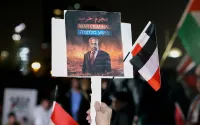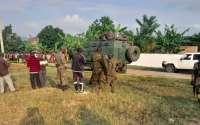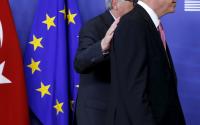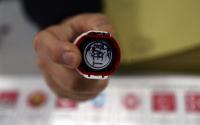Bush's standing in the polls fell immediately, and even quite conservative commentators are upset by Kay's findings and by the fact that the U.S. went to war on false pretenses. Everyone now wants to know how U.S. intelligence went awry, as if that were the problem. It is clear that the intelligence, which was itself faulty, was vastly overinterpreted by the Bush administration to meet their preconceived objectives. And it is not true that everyone was wrong. After all, there were clear voices before - the head of the International Atomic Energy Association, Scott Ritter, and others - saying that there was no evidence that weapons existed.
Bush is on the defensive. The coterie that surrounds him gives out different stories. Colin Powell now is not sure there were such weapons, as is Bush himself. Cheney and Rumsfeld are still saying they expect them to turn up. But no matter. The justification has changed. Bush tells us that Saddam Hussein had "the capacity to produce weapons." And besides, "he was a dangerous man," and "this is a dangerous world." Saddam Hussein is/was a "madman" who could potentially make a weapon and "then let that weapon fall into the hands of a shadowy terrorist network." In addition, "when the United States says there will be serious consequences, and if there isn't serious consequences, it creates adverse consequences." Eventually, who knows?, he might have made a nuclear weapon and then the U.S. "would have been in a position of blackmail."
It's gotten to be so thin an explanation that the United States today has lost all credibility, probably even with Tony Blair, who alas would never admit it. Meanwhile, things are not going well in Iraq at all. Five to ten Americans are being killed each week. And it's mighty dangerous to try to enrol in the Iraqi police force. Iraqi women are now afraid to leave their homes because of fundamentalist pressures. Iraq's code governing women, formerly the most progressive in the Arab world, has just been repealed by the Iraqi interim authority in favor of the sharia. The United States would dearly like to get out as soon as possible from the quagmire in which they said they would never be caught. It would like to turn over sovereignty to an Iraqi government by June 30. It would like the United Nations to take over post-June supervision of political negotiations among the Iraqis. It would like NATO to take over managing a stabilization force. It is not clear that it can achieve any of these wishes.
The June 30 turnover to Iraqis is bogged down at the moment because the Shia are insisting on elections (democracy, remember?) which they would win. The Kurds are insisting on virtual self-rule. And the Sunnis are insisting on not losing everything. The Shia and the Kurds have military units in existence, and the Sunnis are no doubt going to create one. The United States has suddenly produced a document showing that this ethnic conflict is all an Al-Qaeda plot. The reality is that it will be miraculous if post-June there isn't a rather unpleasant civil war. If the United States thinks that Kofi Annan and NATO want to get caught up in the middle of that, the U.S. better think again. The Neue Zurcher Zeitung, Switzerland's leading newspaper and scarcely a newspaper hostile to the U.S., has just run a cartoon showing a cement mixer labeled "Iraq reconstruction" pouring over George Bush in military costume and already half buried in the cement. Looking on are bemused spectators labeled U.N. and Europe, to whom Bush says somewhat desperately "Well, if you really insist on giving a hand."
The problem is that George Bush has nowhere to go. He has a difficult election coming up, and lots to explain about his own Vietnam war record. He can bluster all he wants about how nuclear proliferation is such a great danger that everyone should give up making even nuclear fuel for peaceful purposes, or face the consequences. Meanwhile, he is proposing to expand the nuclear bomb capacity of the United States. So, we may expect a rush of countries to cease nuclear fuel production.
And then there's the little matter of the economic hole he's been digging for the United States. If you give back most of the taxes and expand mightily war expenditures, of course the deficit is going to rise to astronomical proportions. He is scaring the pants off the serious capitalists of the world. And even his ultra-right wing economic conservatives in Congress are threatening to abstain in the next elections because of the endlessly rising deficit.
Bush did leave us with one last consolation in that interview with Tim Russert on NBC. He said "a free Iraq will change the world." I'm hoping myself that a free Iraq, if ever we and the Iraqis get there, might even change the United States. Who knows? It will be Bush's legacy.






